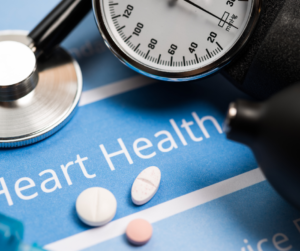
Heartbreaks are painful, but did you know that heart disease is the leading cause of death in the United States, with more than 655,000 people dying from the condition each year. This equates to one in four deaths attributed to this awful disease. The most common form of heart disease is coronary artery disease (CAD), which is what can cause heart attacks.
CAD is caused when a substance called plaque builds up in a person’s arteries. As the buildup grows, the opening of the arteries gradually closes until blood flow is blocked and the patient experiences a heart attack. While these statistics are sobering, there are several ways we can prevent heart disease. Knowing the “why” about this disease can aid in prevention. First, let’s learn about the big three risk factors of heart disease:
High Blood Pressure
High blood pressure (HBP) is the force of blood pushing against blood vessel walls. This is what your nurse checks when she puts the blood pressure cuff on your arm and pumps air into it at your check-up. She is listening for the pressure when your heart beats and the pressure for when your heart is at rest between beats. High blood pressure usually has no signs or symptoms so it is very important to keep your annual physical appointments with your doctor and to follow her recommendations if she diagnoses you with HBP.
High Cholesterol
High cholesterol is when you develop fatty deposits in your blood vessels. These deposits can lead to narrow vessels and increase your chance of a heart attack. It is determined through blood tests. While high cholesterol can be inherited, it can also be prevented through medication, diet and exercise.
Smoking
Smokers are four times more likely to develop heart disease than non-smokers. The nicotine in smoke reduces your blood flow, raises your blood pressure, and speeds up your heart. Quitting smoking will not reverse the damage done to your heart, but it greatly reduces the damage going forward to your heart and arteries.
In addition to the three key risk factors, it’s important to explore what we can do to prevent it. Prevention behaviors can take you from the danger zone of heart disease and put you on the path to a healthy heart.
Heart Disease Prevention
Healthy Diet
According to the Mayo Clinic, simple tips to prevent heart disease by diet include tips like these: controlling portion size, eating more vegetables and fruits, selecting whole grains, limiting unhealthy fats, choosing low-fat protein, reducing sodium intake, and limiting treats.
Healthy Weight
Being overweight increases your risk for heart disease. One measure used to determine if your weight is in a healthy range is body mass index (BMI). If you know your weight and height, you can calculate your BMI at CDC’s Assessing Your Weight website. When in doubt, consult a physician who can help in calculating whether your health is at risk due to weight.
Physical Activity
Among the many benefits to getting enough physical activity can, it can help you maintain a healthy weight and lower your blood pressure, cholesterol, and sugar levels. From walking, to swimming, to cycling, adding even moderate activity to your routine can have a great impact on your heart health. Just remember, it’s always a good idea to check with your doctor before starting any new exercise regimen.
Quit Smoking
Smoking cigarettes greatly increases your risk for heart disease. If you don’t smoke, don’t start. If you do smoke, quitting will lower your risk for heart disease. Your doctor can suggest ways to help you quit, and you can find many other helpful resources, including creating a tailored plan to help you quit at SmokeFree.gov.
Limit Alcohol
There’s a good reason your doctor asks about routine alcohol consumption at each check-up. Drinking too much alcohol can drastically raise blood pressure and binge drinking can increase heart rate. For heart health, the medical guidelines state that men should have no more than two drinks per day, and women only one. Talk to your doctor if you aren’t sure whether or not you should drink alcohol or how much you should drink for optimal heart health.
Check out these great resources to better educate yourself and others on heart health:
Understand Your Risks to Prevent a Heart Attack

 (804) 673-6676
(804) 673-6676


